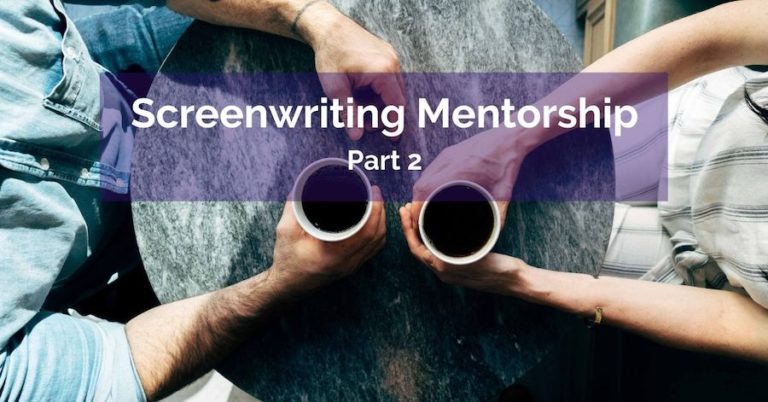How to Find a Mentor Who Meets YOUR Requirements

MENTORSHIP: PART TWO
The chase is on …

Cary Grant, “North by Northwest” (1959)
Now that we’ve learned the 10 requirements of a successful screenwriter-mentor relationship, the question becomes:
“How do I find a screenwriting mentor who is experienced in all aspects of film, from development to release?
And, how do I find someone with whom I could personally relate?
The chase can be intimidating.
***
In Pursuit
I inadvertently found my first screenwriting mentor in 2007. I had written a screenplay based on a property I optioned, and wanted to pursue a specific director for the project.
The individual I had in mind, who will remain anonymous here for discretion's sake, was a billion- dollar-grossing screenwriter-director over several films when I made my initial approach.
The billion-dollar gross was domestic, by the way.
I found his agent's name and contact information online, and left a voicemail. I was not yet a subscriber to IMDbPro. I couldn't afford it.
And, at this point in my career I knew no one. I was flying blind.
Call One: "Hello, my name is Joel Eisenberg. I'm calling for _________. I have an optioned property I'd like to talk to your client, _______, about. I have a screenplay. You can return my call at _________. Thank you."
I was not as polished then as I am now. My call was not returned. I called back a month later.
Call Two: "Hello, my name is Joel Eisenberg. This is my second message. I'm calling for ________ regarding an optioned property I'd like for one of your clients to read and possibly direct. I can be reached at _______. Thanks."
Nothing. Not a peep. I called back again the following month.
Call Three: "Hello, this is my third message. My name is Joel Eisenberg. I'm trying to get a script to _______ for a film I'd like him to possibly direct. I can be reached …" Yada yada yada.
One week passed. Two weeks passed. Three …
I was ready to pick up the phone again, and I have to admit at this point I was feeling like De Niro's Rupert Pupkin in Scorsese's King of Comedy. If you don't get the reference, watch the movie.
My phone rang. It was the agent. Finally.
Agent: "Joel, this is _______. You've left me a bunch of messages and I'm really busy. Tell me briefly about your project, keep it short, and is it funded?"
I was at least seasoned enough to realize he was determining if the project was real. Based on his tone, he was the height of unenthused. I had all of about 10 seconds to convince him. This was my moment. Had to be. And I was going to be honest.
Me: "I have a five-year option on the property, it's paid up, and no the film isn't funded. I know your client loves the property based on interviews, and I want to leverage his name as an attachment so I can move forward."
That was the gist. I shut up. I learned from my telemarketing days that when you make a pitch you shut up until you hear back.
A few interminable seconds passed.
Agent: "Send me the script. Okay? If he's interested you'll hear from him."
I was transferred back to his assistant before I could say another word, who gave me the agent’s email.
We hung up.
I felt that I blew it, but I sent the script anyway.
Three weeks later I came home to a blinking voicemail light. I pressed the button and listened to the message —which I still have.
Voicemail: "Joel, my name is ________. I understand from my agent you've been a pain in the ass. Well, kudos to you. I hate my agent. My home number is _________, my cell phone number is _________, and my editing bay is __________. Now that you got me, there's no excuses. I read your script. I'm interested in talking. Let me know if you like bagels and lox and if you can come by the house tomorrow. I gotta get rid of this lox! Call me."
I called him, hurriedly visited Costco for a new pair of jeans, and went to the house the next day.
As Rick Blaine said to Captain Louis Renault in Casablanca, that was "the beginning of a beautiful friendship."
And a mentorship.
***
We hit it off. We developed my project further, had a bunch of studio and production company meetings… but ultimately it never sold.
A reality in the business.
Over time, however, I had become a trusted friend to the man. He had experienced it all in the business and knew — or had access to — nearly everyone.
Today I consider him like a big brother, and he has helped me immensely.
As I have helped him. Pardon the cliché, but our relationship had become a two-way street.
***
My good fortune was inadvertent. I was looking to attach a director to a script, not a mentor.
But early on in that relationship I learned something. I learned that I really did need the help, as my career was going nowhere.
Since then I’ve sold projects to several networks and streamers, became a WGA member, and wrote and/or produced independent films before focusing on television.
I paid attention. And my buddy, incidentally, also had a mentor.
I'd offer the following advice to you in your search:
Due diligence is all important. Firstly, read up on a desired contact. Do some research. Determine if any of the above bullet points from Part One of this article appear to match the type of mentor you are looking for, and plan to reach out.
Don't be obnoxious. If you attain contact information, do not do this: "I'm looking for a mentor, can you help?" That's far too forward. Do this instead: Introduce yourself, approach with a question or two, and go from there.
Attend networking groups and speaking engagements. Put yourself in the mix. If you do not live in a state where guest speakers are common, attend a few online courses or events and, if so compelled, request a speaker's contact information. During this period of Covid-19, when most events are online anyway, you have an advantage.
Use social media to message or tag a particular favorite screenwriter. I've done exactly this over the years, well before anyone was familiar with my name. I was stunned at the responses I received, until I made it part of a networking practice I continue to this day.
Follow up if you don't hear back. But be mindful of the fine line between reaching out and harassment. It's an easy line to cross. I was feeling that way early with my mentor, which is why I reached out to the agent once monthly. It worked.
Finding a mentor is difficult, but can pay off handsomely.
Once the relationship begins, though, you need to see it through.
If either slacks off, the damage can be irreparable. However, if both parties are determined, you may have just taken a giant leap in your career.
Are you ready?
Thank you for reading.
---
Joel Eisenberg is an award-winning writer and producer, and partner in Council Tree Productions, a television development company. He writes and edits a publication for Medium, "Writing For Your Life," which you can follow here.
Tags
Get Our Screenwriting Newsletter!
Get weekly writing inspiration delivered to your inbox - including industry news, popular articles, and more!



























